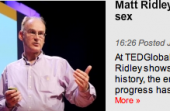TED: Just Admit It
TED: Just Admit It

The September issue of Fast Company contains a breathless look at TED and the viral-video nature of clips featuring its flagship conference’s 18-minute lectures — known as TED Talks — by Anya Kamenetz. I spent a good part of this afternoon trying to figure out why this piece, which calls the network of conferences and videos “the new Harvard” in its URL but curiously backs off that claim in its actual headline, got my outrage-o-meter popping. Let’s find out!
Early on, Kamenetz says that she “would go so far as to argue that [TED] is creating a new Harvard — the first new top-prestige education brand in more than 100 years.” Wow! But many breathless paragraphs later, she concedes that the videos, which are the way that those people who haven’t been invited inside the conference’s sanctum experience the brand, have their limitations: “An 18-minute presentation, no matter how expert, can’t accommodate anything overly theoretical or technical — the format is more congenial to Freakonomics than economics.” So, it’s really more like correspondence school? Or sitting in Barnes and Noble and reading the books that inevitably result from these videos going “viral”? (Or, really, their tables of contents?)
And then there is the self-congratulatory sheen that every person involved in the story possesses, which somehow especially rankles during the discussion of said videos being free of charge for the non-invitees. Which, well, you get what you pay for (see the aforementioned note about Freako/eco divide). And it’s not like TED is a completely “no, thanks, we don’t need your money anyway” endeavor; isn’t there a complicated matrix of admission policies that is involved with letting people in the door? Where, as Kamenetz notes, this happens:
It’s “networking extraordinaire — just a total bonanza,” says Cyndi Stivers, editor of Entertainment Weekly’s EW.com. And out of that networking comes action. Wired magazine was born there. An Inconvenient Truth got a big push at the conference. Researchers and not-for-profits find sponsors; writers and scholars find agents and publishers; Web geeks find a path out of obscurity. Esra’a Al Shafei is a 23-year-old from Bahrain who runs an online hub for journalism and free expression called MideastYouth.com. In 2009, she was made a TED Fellow at the TEDGlobal conference in Oxford. “TED gives you a sense of credibility,” she says. “I’ve been running Mideast Youth for four years, but before the fellowship, nobody talked about it.” TED connections have led her to sources of money and technical and moral support that helped her launch CrowdVoice, which tracks voices of protest around the world.
The lack of interpersonal connection afforded by just watching videos while you’re at home (if you have the time, that is) is apparently being rectified by TEDx conferences, which are satellite events around the world in which “at least 25% of the content must be existing TED talk videos.” (Keeping the branding alive, of course.) Many of them are free; the New York event will require those people who are accepted to pay $100, because in this city every piece of networking has to have a price tag attached. Kamenetz does note, though, that it’s hard to “keep up quality control if you let everyone play.”
And you know, perhaps the breathless thesis laid out by that SEO-baiting URL is correct. Maybe TED is like an elite college in a way — you apply for the right to pay money and hang out with a bunch of people who were also able to pay money (and a few people who got in on just smarts), and then the people who weren’t up to snuff can get just the “teaching” part of the equation.
So why am I so annoyed by Kamenetz’s lofty claims, then? Was it the lede, in which you could see her patting herself on the back as she described her “discovery-seeking brain [getting] a little hit of dopamine in the middle of the workday”? Was it the fact that Eat, Pray, Love author Elizabeth Gilbert speaking “on creativity” is one of the talks being touted? Was it the claim that this is somehow a “new model” of education, when it really isn’t? Was it the idea, vaguely inferred by Stivers’ quote, that TED helped bring forth the absolute clusterfuck of comment-baiting gallery-listicle hybrids that is the current iteration of EW.com? Was it the closing revelation that the organization’s next big step is — gasp! — a social network (or, rather, “a set of tools that will allow people to hold conversations and plan meetings through ted.com”)? Or is it just that in keeping with the Fast Company editorial direction of Extreme Extremism, everyone involved sounds a bit, well, smug? Actually all those questions could probably be combined into one: “Are these people just getting a little too excitable about the beautiful view from inside their bubble here?” You can probably figure out the answer.
[Via]
